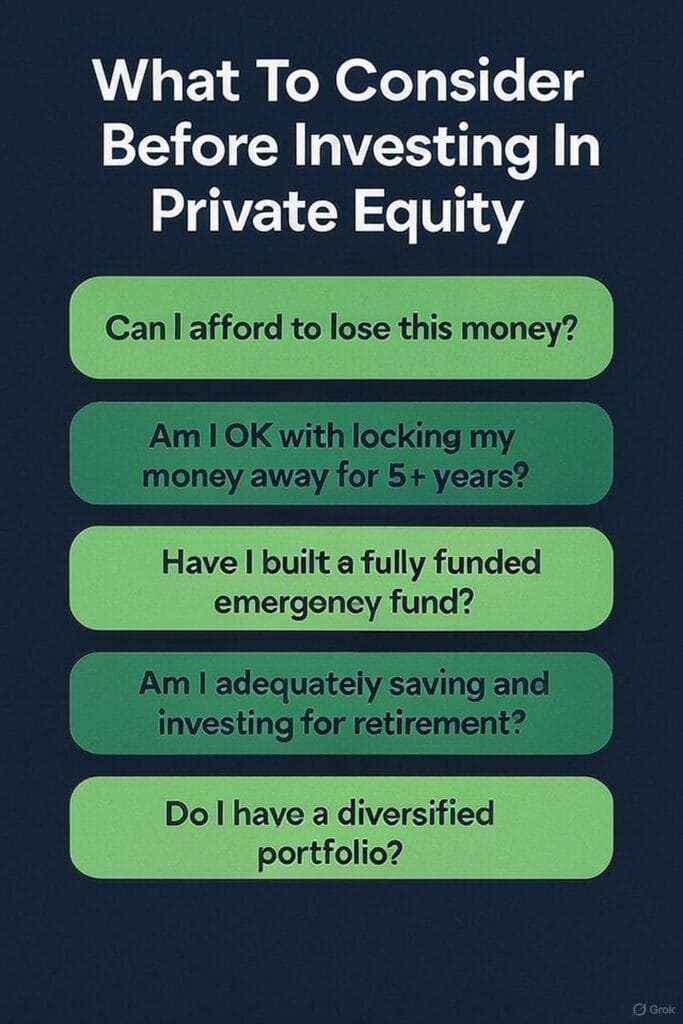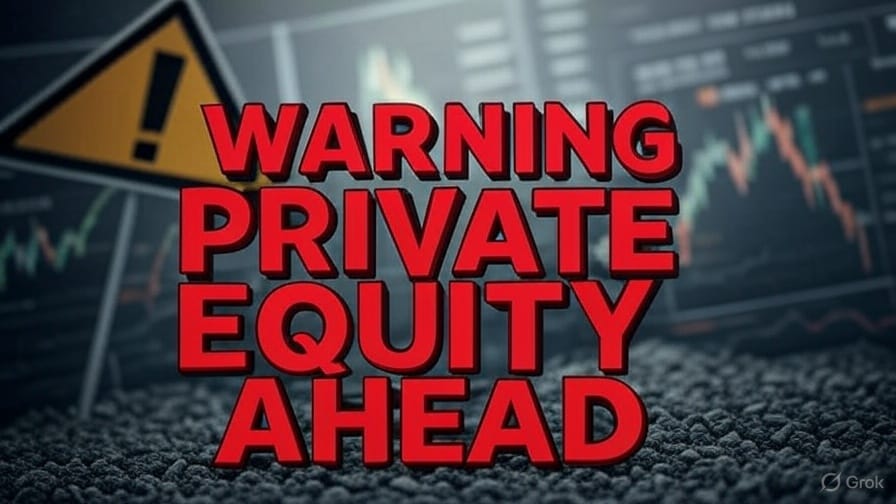In this post, we will explore the risks of investing in private equity for beginners. But first, our disclosure:
Disclosure: This post may contain affiliate links, meaning we earn a commission on purchases made through those links at no extra cost to you. As an Amazon Associate, I earn from qualifying purchases.
Disclaimer: The content on this site is for informational and educational purposes only and does not constitute financial, investment, legal, tax, or any other professional advice and should not be used as a substitute for professional advice. For more details, read our full Disclaimer.
What’s Up With Private Equity?
When many people hear the term “private equity,” they often think of millionaires, billionaires, and large institutional investors. However, that is no longer the case.
Thanks to online platforms and crowdfunding portals, everyday investors can now participate in private equity. You no longer need to be an accredited investor with a high income or a net worth in the millions to get in on the action. Whether you are a millionaire or have just $500 in your bank account, practically anyone can get involved in private equity today.
Thanks again to these new platforms and online influencers, private equity is being marketed as the next big thing. The idea of investing in private equity is enticing. Who doesn’t want to invest like a millionaire or a huge multi-billion-dollar institution?
However, just because you can invest in private equity doesn’t mean you should. The reality is that what you see is not always what it seems. Therefore, it’s important to understand the risks before making any investment in private equity.
This guide breaks down the key risks associated with investing in private equity, particularly for retail investors and those new to the market.
Let’s dive in and explore what private equity is and its risks.
What Is Private Equity?
Private equity refers to investment funds that acquire ownership stakes in privately held companies. It involves investing in companies that are not listed on public stock exchanges and can include:
- Early-stage startups or venture capital – These are young, small companies that are high-risk investments with a high potential for success or failure.
- Growth-stage companies are those that have achieved a level of success and are experiencing rapid growth.
- Turnaround or distressed companies – Private equity firms invest in companies that are struggling or in financial distress, with the goal of turning them around and potentially selling them for a profit.
- Private real estate funds – These funds pool money from investors to purchase, manage, and sell real estate.
Private equity firms take an active role in managing their investments. The goal is to buy in early, grow the business, and exit at a profit, often through acquisition or an IPO. Sounds great. Right?
Not so fast!
All investments involve risk, with some being riskier than others. Investing in private equity is no different. If you are interested in private equity, here are some of the risks you need to be aware of before investing:
6 Major Risks of Private Equity for Beginners
1. Illiquidity: Your money Is Locked Up For Years
One of the major drawbacks of investing in private equity is the limited liquidity.
Unlike publicly traded stocks or funds, which can be sold whenever you want, investments in private equity are typically locked up for five or more years. If you need access to that money in an emergency, you’re out of luck, as most private equity funds have limited redemption periods and impose caps on withdrawals.
For example, the ARK Venture Fund limits redemptions to quarterly repurchases, capped collectively at 5% of the fund’s net asset value (NAV). Similarly, another popular private equity fund, the Cashmere Fund, offers a comparable redemption structure; however, it limits repurchases to only twice a year, instead of quarterly.
Fundrise, a popular private crowdfunding real estate company, offers quarterly redemptions that impose a 1% penalty if redeemed within 5 years. They also note that redemptions are subject to limitations, meaning that in a down market, they may freeze redemptions.
Therefore, while these funds allow regular folks to invest in private equity, they don’t make it any easier to access your money when you need it. Although you can start investing with as little as $500, you likely won’t see that money again for quite some time.
2. High Fees
When it comes to private equity, high fees are the norm.
Many private equity funds employ a fee structure known as the “2 and 20” model, meaning:
- 2% Management fee of the total assets under management to cover fund expenses, like marketing and salaries
- 20% Carried Interest, or performance fee, taken on the profits after selling an investment
These high fees may seem like venture capitalist greed gone amok, but there is a rationale behind them.
First, these are not your typical passive index funds. Instead, private equity requires active research, management, and deal-making. Additionally, you want fund managers to have strong incentives to generate profits, hence the 20% carried interest performance fee. If the managers make a big profit, the investors also reap those profits.
However, some of the newer private equity funds that are open to non-accredited investors are eliminating the 20% carried interest fee. Instead, they are incorporating them into the fund’s expense fee.
For example, the Cashmere Fund does not charge the 20% carried interest fee; instead, it applies a higher expense fee capped at 5.9%. Likewise, the ARK Venture Fund charges a higher expense fee in lieu of the 20% carried interest fee.
Regardless of the fee structure, they are much higher than those of other investments, such as index funds, which often charge a fraction of a percent.
3. High Risk of Total Loss
There’s a reason why, historically, the SEC has limited investing in private equity to accredited investors with high net worths and incomes; it’s a highly risky investment, and there’s a significant risk of total loss.
It has become almost conventional wisdom that most startups fail. Some put the number as high as 90%. Even mature businesses can collapse.
Due to this risk, it is extremely important to exercise caution when considering investing in individual startups through crowdfunding websites. Before investing, thoroughly research each startup. Find out how they plan to make money, their financial health, and whether there is a market for their products or services.
The same is true if you are interested in investing in a private equity fund. Private equity funds typically invest in a diverse range of companies, fully aware that many of their investments may not succeed. In essence, it’s a numbers game. Therefore, be sure to read its financial and investment disclosures, as well as its prospectus.
The bottom line is that investing in private equity is inherently risky, and no amount of due diligence can guarantee protection from losses.
4. Overconfidence And Unrealistic Expectations
While these new platforms and funds enable retail investors to invest like the wealthy, they should not expect to be treated the same way.
Many new investors are attracted to private equity by the promise of returns of 20-30%, often believing these returns are nearly guaranteed. While such returns are possible, they are not typical for the average retail, non-accredited investor. The best deals usually go to institutions and high-net-worth individuals rather than retail investors using online platforms.
As a result, retail investors are likely to experience much lower returns, which will be further diminished by the high fees associated with private equity investments.
5. Lack of Transparency and Protection
The private equity industry is complex and often difficult to understand. It can be challenging for investors to know how these companies operate and manage their finances. There is little regulation or legal protection in place to safeguard investors’ interests.
Unlike public companies, private firms don’t have to publish audited financials or earnings reports, making it hard to:
- Assess performance
- Understand risk
- Compare investment opportunities
This is not to say private equity firms do not publish financials and earnings reports; however, the regulatory requirements they face are less stringent.
The lack of transparency and regulatory protection can put retail investors at a disadvantage when it comes to investing in private equity. As a result, retail investors may not fully understand the risks associated with their investment. This lack of transparency can leave them flying blind and vulnerable to significant losses.
6. FOMO
Investing in private equity can be alluring, leading to the phenomenon known as FOMO, or Fear of Missing Out. This is when people feel pressure to act quickly, worrying that they might miss a great investment opportunity.
Never underestimate the power of FOMO. It might just be the biggest downfall of investors.
Let’s be honest: we are constantly under pressure from social media and online influencers. Many posts focus on get-rich-quick schemes or promises of tenfold returns on your money. Private equity fits perfectly into that narrative.
Private equity investments are appealing because they offer the chance for high returns and are associated with the wealthy. However, the rush to invest in the newest fund or an exciting startup can lead people to make rash decisions that they might regret later.
That’s why it’s critical for investors to take their time and think carefully before making any investment decisions, rather than succumbing to FOMO induced anxiety.
As the adage goes: “Be careful not to confuse hype with opportunity.”
Should Beginners Avoid Private Equity Altogether?
Not necessarily. However, for the average retail investor, it is probably best to view private equity as a small part of a diversified portfolio, especially for beginners.
Before investing in private equity, it would be wise to ask oneself:
- Can I afford to lose this money?
- Am I okay with locking my money away for 5+ years?
- Have I built a fully funded emergency fund?
- Am I adequately saving and investing for retirement? Maybe even maxing out my retirement accounts?
- Do I have a diversified portfolio?
If the answer is “no” to any of these questions, then it might be better to wait or stick to more liquid, regulated investments.
If the answer to these questions is “Yes,” it does not mean someone should invest in private equity. However, if someone is ready and wants to do so, it is probably best to start with a modest investment.
Starting with a small investment enables individuals to gain valuable insights into the complexities of private equity while minimizing financial risk if things do not go as planned. By starting small, one can gradually build their knowledge and assess whether private equity is right for them.

Alternative Ways to Invest in Private Equity
If you want exposure to private equity but prefer a more traditional investment approach with better liquidity, there are options available, including:
- Publicly Traded Private Equity Firms – Investors can invest in stocks of publicly traded private equity companies. For example, stocks of the largest private equity firms, such as Blackstone (NYSE: BX), KKR & Co (NYSE: KKR), and The Carlyle Group (NASDAQ: CG), are available to retail investors on major public stock exchanges.
- Private Equity Exchange-Traded Funds (ETFs) – ETFs consist of a collection of securities bundled together as a single investment and are traded on public exchanges. Private Equity ETFs invest in companies that specialize in private equity. For instance, the largest Private Equity ETF, the Invesco Global Listed Private Equity ETF, comprises more than 79 holdings, including Blackstone, KKR, and The Carlyle Group.
- Publicly Traded REITs (Real Estate Investment Trusts) – Publicly traded Real Estate Investment Trusts (REITs) are listed on major stock exchanges and focus on owning, operating, and financing income-generating real estate. They are particularly renowned for their regular dividend payouts. One example is Realty Income Corporation (NYSE: O), which owns over 15,000 commercial properties and pays a monthly dividend to its shareholders.
Final Thoughts on the Risks of Private Equity for Everyday People
Private equity can seem glamorous with the perception that it is the “secret weapon” of the wealthy. But the reality is far more complex and riskier. Yes, it has the potential for high returns, but those returns are not without risks:
- Illiquidity that can lock up your money for 5–10 years or more
- Lack of transparency, leaving you with little visibility into performance
- High fees that eat into returns
- And, most importantly, the real possibility of losing every dollar invested
For institutional investors and high-net-worth individuals, these risks are manageable, as they have diversified portfolios, professional advisors, and enough capital to absorb losses. For everyday investors, however, even a small misstep can be devastating.
If you’re new to investing—or working with limited resources—think of private equity as a long-term, high-risk play. Above all, remember that good investing isn’t about chasing trends or “exclusive” opportunities—it’s about patience, strategy, and discipline. It’s about having a solid foundation of diversified investments and emergency savings.
In other words, you need to walk before you can run. And when it comes to private equity, proceed with caution. Remember, there is no shortcut to wealth, no matter what online influencers promise.






